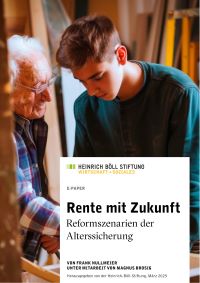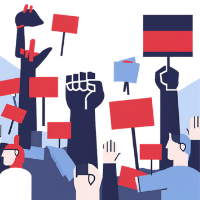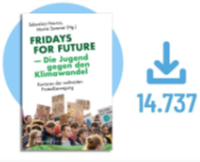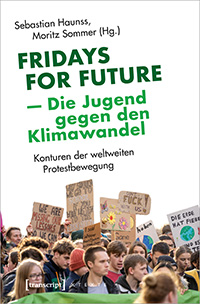
Contact:
Prof. Dr. Frank Nullmeier
SOCIUM Research Center on Inequality and Social Policy
Mary-Somerville-Straße 5
28359 Bremen
Phone: +49 421 218-58576
E-Mail: frank.nullmeier@difis.org
Information on press releases and publications of the department "Theoretical and Normative Foundations".


Die Deutsche Vereinigung für Politikwissenschaft (DVPW) ist mit derzeit über 2.000 Mitgliedern die größte Fachorganisationen für Politikwissenschaft. Sie vertritt nicht nur das Fach etwa bei Anhörungen durch Parlamente oder gegenüber den Kultusbehörden für das Schulfach Politik, sondern schlägt auch die Vertreterinnen und Vertreter des Fachs für die Wahl der Fachkollegien der Deutschen Forschungsgemeinschaft (DFG) vor. Der neue Vorsitz ist wie der neue Vorstand für eine Drei-Jahres-Periode (bis 2027) gewählt. Markus Tepe war bereits im bisherigen Vorstand (2021-2024) stellvertretender Vorsitzender der Vereinigung.
Markus Tepe ist seit Oktober 2023 Professor für Politikwissenschaft mit dem Schwerpunkt Politisches System der Bundesrepublik sowie Theorie und Empirie des Wohlfahrtsstaates an der Universität Bremen sowie Abteilungsleiter am SOCIUM. Er studierte Politikwissenschaft, Öffentliches Recht und Wirtschaftspolitik in Münster und promovierte an der Freien Universität Berlin. Forschungsaufenthalte führten ihn unter anderem an die Universitäten Stanford und Yale. Tepe war Juniorprofessor für Positive Politische Theorie und zuletzt Professor für das Politische System Deutschlands an der Universität Oldenburg. Seine Forschung befasst sich mit den Determinanten von Wahl- und Entscheidungsverhalten in Politik und Verwaltung.
Weitere Informationen
https://www.dvpw.de/informationen/infos/details/news/neuer-dvpw-vorstand-gewaehlt-1



The book on Fridays for Future edited by Sebastian Haunss and Moritz Sommer is the most downloaded book of the transcript Verlag this year. The book is the first comprehensive academic study on Fridays for Future, and the publication was supported with open access funds from the University of Bremen.
 Interdisciplinary Social Policy Research Network (FIS), Federal Ministry of Labour and Social Affairs
Interdisciplinary Social Policy Research Network (FIS), Federal Ministry of Labour and Social AffairsSCIENCE GOES PUBLIC! is an innovative format of knowledge transfer in Bremen and Bremerhaven. Topics are presented publicly in 30 minutes in selected pubs and bars to a wide-ranging audience. The SOCIUM Research Centre for Inequality and Social Policy is participating this time with two contributions: Wanda Schwarze-Wippern and Christof Wittmaack will give a talk on "Nur fordern, wenn's foerdert?" at 1st Class Suidice (Friedrich-Ebert-Str. 53-55, 28199 Bremen) on 4 November 2021 at 8:30 pm, Sebastian Jürss will talk on "Da klafft 'ne Gerechtigkeitsluecke einfach auf" at Gondi (Langemarckstr. 249, 28199 Bremen) on 11 November at 8:30 pm.
The junior research group "The 'Activating Welfare State' – A Political and Social History of German Social Policy, 1979-2017" and the research project "GEVOAB - Ideas of Justice held by Recipients of Unemployment Benefit II" are funded by the Federal Ministry of Labour and Social Affairs within the framework of the Interdisciplinary Social Policy Research Network (FIS).


Gefördert wird die neue Einrichtung vom Bundesministeriums für Arbeit und Soziales (BMAS) mit 8 Millionen Euro über fünf Jahre. Die Eröffnung ist am 1. April 2021.
„Gute Politik ist angewiesen auf engagierte Wissenschaftlerinnen und Wissenschaftler, die weitsichtig und mit analytischer Tiefe Veränderungen erkennen und deren Auswirkungen unabhängig beschreiben“, erläutert Frank Nullmeier vom SOCIUM Forschungszentrum Ungleichheit und Sozialpolitik der Universität Bremen und Leiter der Bremer Abteilung des neuen Instituts. „Die fundierte Analyse von aktuellen Veränderungen in Gesellschaft und Arbeitswelt und deren Auswirkungen auf bestehende sozialstaatliche beziehungsweise sozialpolitische Arrangements ist unabdingbar für einen informierten sozialpolitischen Diskurs.“
Stärkung der Sozialpolitik- und Ungleichheitsforschung
Zu den Kernaufgaben des Instituts für Interdisziplinäre Sozialpolitikforschung gehört daher, zu den Zukunftsthemen der Sozialpolitik zu forschen und den Transfer zwischen Wissenschaft und Praxis zu fördern. lfristig Darüber hinaus soll die Einrichtung die inhaltliche Vernetzung und Koordinierung des seit 2016 bestehenden Fördernetzwerks Interdisziplinäre Sozialpolitikforschung (FIS) übernehmen.
Jutta Günther, Konrektorin für Forschung, wissenschaftlichen Nachwuchs und Transfer, gratuliert: „Die Bremer Beteiligung am aufzubauenden Institut für Interdisziplinäre Sozialpolitikforschung ist eine große Auszeichnung für die beteiligten Wissenschaftlerinnen und Wissenschaftler der Universität Bremen und insbesondere des SOCIUM. Es stärkt die angewandte Sozialpolitik- und Ungleichheitsforschung an der Universität Bremen sowie den Transfer wissenschaftlicher Erkenntnisse in die Politikberatung.“
Fördernetzwerk Interdisziplinäre Sozialpolitikforschung
Mit dem Fördernetzwerk Interdisziplinäre Sozialpolitikforschung (FIS) stärkt das Bundesministerium für Arbeit und Soziales (BMAS) die Forschung und Nachwuchsförderung im Bereich der Sozialpolitik an deutschen Hochschulen. Wissenschaftlerinnen und Wissenschaftler sollen sich im Feld der Sozialpolitikforschung etablieren können, die jeweiligen Hochschulen im Bereich der Sozialpolitik- und Sozialrechtsforschung Strukturen ausbauen bzw. neu bilden können.
Weitere Informationen:
www.fis-netzwerk.de

Fridays for Future was successfull where environmental NGOs and climate protests in the 20 years before failed. They have succeeded to alter the issue of climate change from a relatively abstract topic that is negotiated at international conferences to one that mobilizes tens of thousands of people to protest on the streets. In the six months before the Corona pandemic, according to opinion polls, climate change had become the top most important issue in Germany. With Fridays for Future, climate protests have gained unprecedented popular support and political attention.
But who actually participates in this social movement? What motivates people to protest and what are the attitudes and convictions of the protesters? Sebastian Haunss (head of the working group Social Conflicts at SOCIUM) and Moritz Sommer (Institute for Research on Social Movements and Protest) have published the first comprehensive scientific study on this new wave of climat protests. Several surveys among protesters from 2019 create the starting point for the analyses in the book »Fridays for Future – Die Jugend gegen den Klimawandel. Konturen der weltweiten Protestbewegung«.
In twelve chapters, the 28 authors of the book provide insights into decision-making and mobilization structures of local Fridays for Future groups, analyze reactions to the protests in the media, politics and society, and examine the attitudes of adolescents and young adults to climate change issues. The individual chapters offer a broad audience access to the first research findings on Fridays for Future. The book is available in print in bookstores and online as an open access version (https://www.transcript-verlag.de/978-3-8376-5347-2).

Every four years all scientists active in research in Germany are asked to elect the members of the Review Boards of the Deutsche Forschungsgemeinschaft (DFG). In this year’s election two members of SOCIUM were successful. Olaf Groh-Samberg was elected for the first time as a member for empirical social research. Frank Nullmeier was reelected as a member for political science in the Review Board for Social Sciences.
The Review Boards of the DFG are important institutions in the peer review process for applications for research funding. Potential members are recommended by universities and research institutions (Max-Planck, Leibniz, Frauenhofer etc.) but most importantly by the associations of the different research disciplines. Olaf Groh-Samberg was not only recommended by a dozen universities but also by the Deutsche Gesellschaft für Soziologie. Frank Nullmeier received support from both German political science associations, the Deutsche Vereinigung für Politikwissenschaft as well as the Deutsche Gesellschaft für Politikwissenschaft. The newly elected Review Boards will commence their work on February 2020.
more Information:
https://www.dfg.de/dfg_profil/gremien/fachkollegien/fk_wahl2019/index.jsp